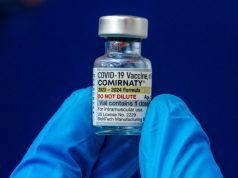Breaking News: Three more lives claimed by fungal meningitis outbreak in the US. The Centers for Disease Control and Prevention (CDC) reported on Thursday that the death toll has now risen to seven.
The number of confirmed cases remains unchanged since the last update, with a total of 34 cases in the US: nine confirmed, 10 probable, and 15 suspected. Health officials are currently investigating 161 individuals who may have been exposed to the outbreak.
The source of the outbreak has been traced back to cosmetic surgeries involving epidural anesthesia at two clinics in Matamoros, Mexico, located just across the border from Brownsville, Texas. Mexican and US officials suspect that a contaminated component of the anesthetic led to the direct injection of the pathogenic fungus Fusarium solani into patients’ spinal cords. The tainted surgeries are believed to have taken place between January 1, 2023, and May 13, 2023, around the time when the clinics were shut down by local health authorities.
In a recent interview, Dr. Tom Chiller, Chief of the Mycotic Diseases Branch at the CDC, revealed that Mexican officials suspect morphine used in the epidural may be the cause. Due to a shortage of morphine in Mexico, it is possible that gray- or black-market drugs were used as substitutes.
Advertisement
Another potential factor could be poor hygiene practices by anesthesiologists. In Mexico, anesthesiologists do not rely on clinic or hospital stores for drugs; instead, they procure their own medications and bring them to the facilities where they practice. This makes it difficult to trace the specific drugs used in the outbreak cases.
Fungal meningitis is a challenging condition to diagnose and treat, as noted by Dr. Chiller. Tests that look for genetic traces of the fungus in the spinal fluid often fail to detect it when it is present. “The fungus itself isn’t present in the fluid; it infiltrates the tissues,” explained Dr. Chiller. “It embeds itself in the meninges and the brain.” The fungus can remain dormant for weeks to months before suddenly becoming active and causing rapid deterioration. In the current outbreak, cases have been reported with symptoms appearing as late as 102 days after a contaminated surgery.
The CDC is urgently advising anyone who underwent procedures at either River Side Surgical Center or Clinica K-3 between January 1 and May 13, 2023, to seek immediate medical attention, even if they are not experiencing any symptoms of infection. Healthcare providers are recommended to perform a lumbar puncture on anyone exposed to check for signs of infection.
Symptoms of fungal meningitis can include fever, headache, stiff neck, nausea, vomiting, sensitivity to light, and confusion.
rnrn
The death toll related to the multistate fungal meningitis outbreak has reached seven, according to the latest reports from the Centers for Disease Control and Prevention (CDC). As of November 6th, the United States has now reported a total of 34 cases of the rare infection, with the majority of them found in Michigan.
The outbreak of fungal meningitis was first detected in early October, after patients in Michigan who had recently received steroid shots began experiencing flu-like symptoms. The source of the infection was traced to a series of contaminated lots of the steroid methylprednisolone acetate, manufactured by the New England Compounding Center (NECC).
CDC officials believe that the total number of cases to eventually surface could reach as high as 200. So far, a total of 161 individuals have been identified as having received the contaminated drug, and are being monitored for signs of fungal meningitis.
The news of the death toll reaching seven has sent shockwaves through the medical community, which is now taking an even closer look at the NECC’s manufacturing processes. Although rare, fungal meningitis can be treated successfully if detected in the early stages, underlining the importance of vigilance on the part of both patients and doctors.
Since the outbreak began in October, the CDC and other health authorities have urged those who have received steroid shots to seek immediate medical attention if they experience any unusual symptoms. As additional cases emerge in other US states, public health officials are continuing their diligent monitoring of the situation, and actively seeking to prevent any further cases from appearing.




















